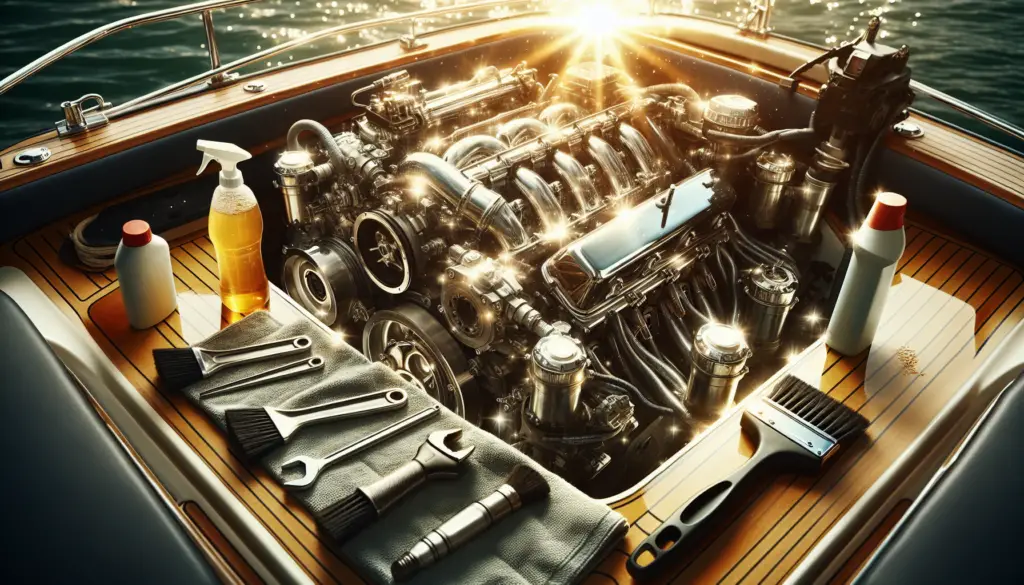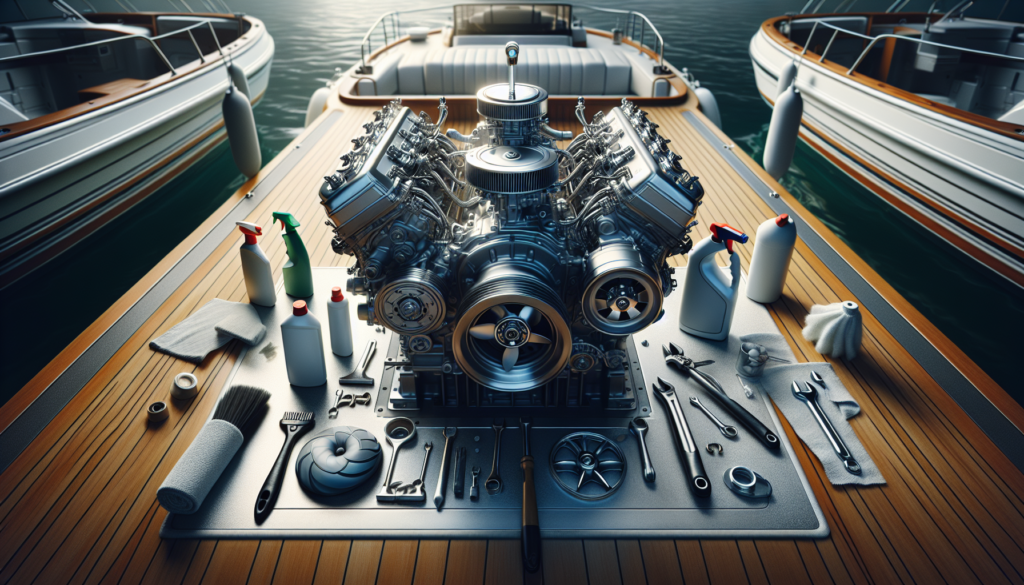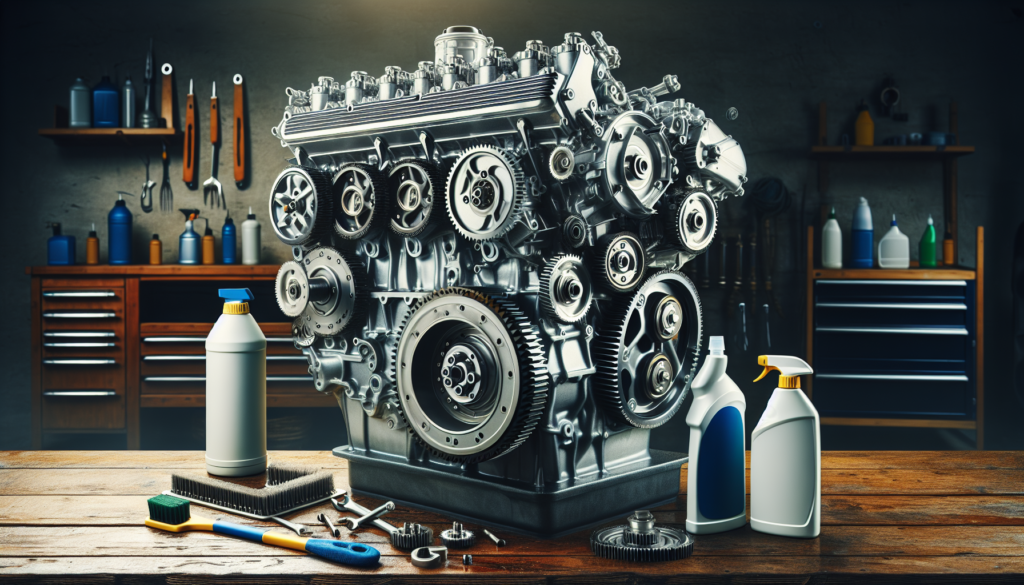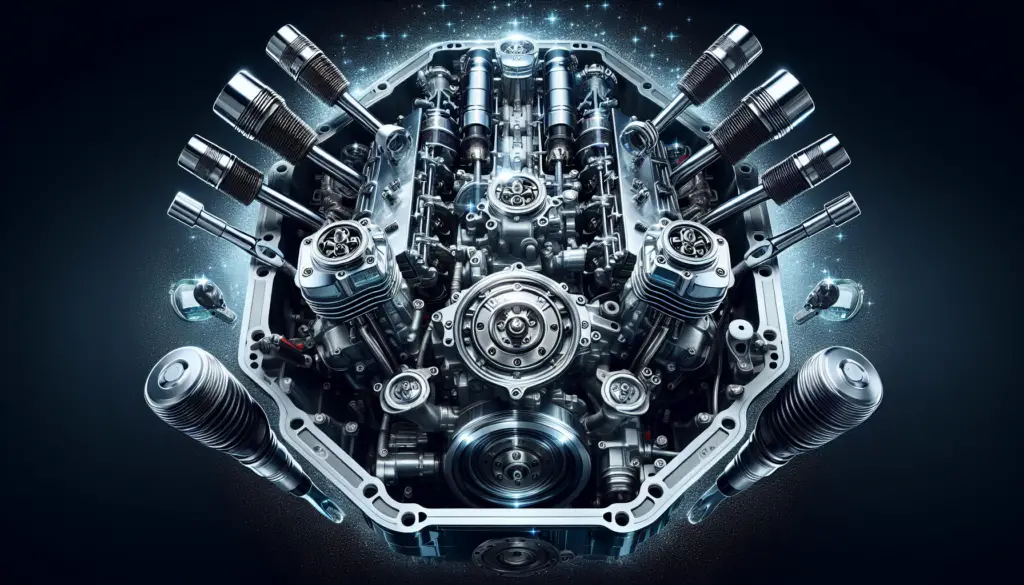Just like a well-kept home promises comfort and longevity, a well-maintained boat engine assures smooth rides and fewer issues down the line. Through “Best Ways to Keep Your Boat Engine Clean and Well-Maintained”, you’ll explore a handy guide with practical tips and essential maintenance techniques to keep the heart of your boat in optimum condition. From cleaning hacks to routine inspections and notice of common faults, this curated roadmap will empower you to increase your boat engine’s lifespan while enjoying the tranquility of reliable performance on the open water.

Understanding the Importance of a Clean Boat Engine
Having a clean and well-maintained boat engine is crucial for the longevity of your watercraft. Not only does it maintain the value of your boat, but also it ensures optimal performance and safety during your water adventures. The following sections will help you understand the benefits of a well-maintained engine and the issues that can arise when boat engines are neglected.
Knowing the benefits of a well-maintained engine
The benefits of a well-maintained boat engine extend beyond the boat itself. Right off the bat, it gives you the peace of mind, knowing that your boat is operating at peak performance and is less likely to breakdown while you’re offshore. It extends the lifespan of the engine, reduces costly repairs and increases fuel efficiency.
Identifying common problems of neglected boat engines
Neglected boat engines are at risk of various problems. These includes corrosion due to saltwater and mineral deposits, wear and tear from residue buildup, reduced performance due to clogged fuel systems, and many more. The cumulative effects of these issues can result in expensive repairs or, in worst cases, complete engine replacement.
Choosing the Right Tools and Products
Cleaning a boat engine isn’t as simple as wiping it down with a cloth. Choosing the right tools and products is crucial for doing an effective job without damaging any components.
Identifying necessary cleaning equipment
To take proper care of your boat engine, you need several tools and pieces of equipment. These can include a quality boat brush suitable for engine cleaning, a marine grease gun, a spray bottle for applying cleaning solutions, and absorbent cloths or rags.
Learning about the best cleaning products for boat engines
There are numerous cleaning products available in the market designed specifically for boat engines. Some top recommendations include marine degreasers and corrosion protectants. It’s important to choose high-quality products that remove grime and grease efficiently and provide protection against corrosion.
Understanding how different products affect the engine and the environment
Different cleaning products have varying impacts on the engine and the environment. For instance, some harsh chemicals may strip away oil that is essential for engine lubrication, leading to increased wear and tear. Additionally, certain cleaning solutions contain pollutants that can harm the ecosystem once they enter the water. As such, opting for eco-friendly cleaners is important.

Routine Cleaning Practices
In order to keep a boat engine running smoothly, you need to follow a regular cleaning schedule. This should involve detailed cleaning of key parts and engine flushing after each use.
Detailing the regular cleaning schedule
Your boat engine should be cleaned thoroughly at least once every few months. However, the cleaning frequency will depend on how frequently you use your boat and the conditions it operates in. Always ensure to wipe off any visible spills immediately to prevent staining or corrosion.
Highlighting the key parts that need routine cleaning
Key parts that need routine cleaning include the fuel delivery system, the cooling system, the ignition system, and the engine block itself. It’s vital to remember that these sections will need different cleaning techniques and products.
Discussing step-by-step cleaning procedures
Depending on the sections of the engine, procedures include spraying and scrubbing off grime, applying degreasers, rinsing, drying to avoid moisture build-up, and applying corrosion protectant. Always ensure to disconnect the battery before proceeding with any cleaning to avoid accidental ignition.
Engine Flushing After Every Use
Engine flushing is a vital maintenance task that should be undertaken after every use of the boat, particularly if it has been used in saltwater.
The purpose of engine flushing
Engine flushing is designed to remove any salt, sand, or other debris that might have entered the engine during operation. Doing so prevents the corrosion and buildup that can impair engine performance.
Defined process of flushing the boat engine
Though it varies depending on the engine type, typically engine flushing involves connecting a hose to the engine’s cooling system intake and running freshwater through it for several minutes.
Problems that can be avoided with consistent flushing
By conducting consistent engine flushing, you can prevent major issues such as salt-induced corrosion, blockage from accumulation of sand or sediment, and overheating due to impaired cooling system.

Proper Fueling of Boat Engine
Ensuring your engine is receiving appropriate and clean fuel plays a pivotal role in its performance and lifespan.
Learning about the right fuel for your boat engine
It’s crucial to use the fuel type that your manual instructs. The wrong fuel can lead to problems such as poor performance, engine deposits, and even damage to the engine.
Understanding the damages of using incorrect fuel
Incorrect fuel can lead to all sorts of issues like reduced engine power, knocking noises, poor fuel economy, and harmful deposits. Over time, it can lead to premature engine wear or even failure.
Discussing fuel stabilizers and their benefits
Fuel stabilizers are a great investment for boats that sometimes sit idle for several weeks. They help prevent fuel from breaking down and forming gums and varnishes that can clog the fuel system.
Keeping Engine Out of Winter Damage
During bitterly cold winter months, it’s essential to protect your boat engine from potential damage due to freezing temperatures. This is a process known as ‘winterizing‘.
Discussing winterizing process
Winterizing involves activities like draining water from the engine, applying anti-freeze, fogging the engine to protect internal parts, and covering the boat to protect it from the elements.
Understanding the importance of winterizing
Winterizing is critical to prevent damage to parts of the engine due to freezing and corrosion. This preventive measure could save you from costly repairs when boating season returns.
Listing products or tools for winterization process
Items you might need for the winterizing process include a suitable marine anti-freeze, fogging oil, a boat cover, and possibly a dehumidifier to prevent the buildup of damp inside the boat.

Recharging the Boat Battery
The boat battery is a vital component that starts your engine and powers your boat’s electronic devices. Proper maintenance, including regular recharging, ensures the battery will not leave you stranded while at sea.
Learning about the role of boat battery
Beside starting the engine, boat batteries are responsible for keeping onboard electronics like navigation systems, pumps, and lights powered. Therefore, it’s crucial to keep your battery in good working order.
Detailing the process of recharging boat batteries
Recharging boat batteries involves using a compatible charger and connecting it correctly to the battery. While charging, be sure to observe safety practices, like keeping flammable materials away and routinely monitoring the charging process to avoid overheating.
Discussing frequency of battery maintenance
Regardless of usage, checking your boat battery every month is essential. Regular checks include maintaining the correct fluid level and ensuring that the battery terminals are clean and free from corrosion.
Regular Oil Change
Changing your boat engine oil on a regular basis is as vital as the fuel you use. Regular oil changes prevent wear and tear, keeping your engine running smoothly.
Understanding why oil changes are needed
Oil lubricates your engine, reducing friction between parts. Over time, it gets contaminated, losing its lubricating properties and ability to cool engine components effectively. This can lead to engine wear or damage.
Knowing the right oil for the boat engine
The boat engine oil you should choose depends on the engine type and the manufacturer’s recommendations. It’s important to use quality marine oil designed for boat engines, rather than car oil.
Disclosing step-by-step oil changing process
The oil changing process involves draining the old oil, replacing the oil filter, and filling up with new oil. Remember to dispose of the old oil correctly as it is harmful to the environment.
Discovering Engine Overheating
Knowing how to recognize and manage engine overheating can save you from costly repairs and dangerous breakdowns offshore.
Recognizing symptoms of an overheating engine
Symptoms of an overheating engine can include a hot-running engine, steam coming from the engine, and an illuminated temperature warning light.
Clarifying actions to take when engine overheats
If your engine overheats, don’t panic. Immediately stop the boat and let the engine cool down. Check for blockages in the cooling system and call a professional if necessary.
Discussing ways to prevent engine overheating
Preventing engine overheating involves regular maintenance, timely changing of coolant, and ensuring the cooling system is free from blockages.
Periodic Inspection of the Boat Engine
Periodic inspections will help catch potential problems before they turn into expensive repairs or unsafe situations on the water.
Identifying what parts to inspect
Inspect key parts like the oil level, cooling system, fuel system, belts, hoses, and props. Look for any leaks, wear and tear, corrosion, or anything unusual.
Detailing a standard inspection schedule
A typical inspection schedule might involve checking some parts every time you use the boat, others monthly, and still others annually. This schedule should be tailored to your specific engine and usage patterns.
Discussing how to conduct a basic boat engine inspection
Conduct a basic boat engine inspection by visually checking over the engine and its related components. Look for any leaks in the hoses, cracks in the belts, or corroded components. Listen to the engine as it runs, noticing any unusual sounds such as knocking or squealing.
And there you have it! By committing to these best practices of maintenance, you should be able to keep your boat engine clean and perform optimally for an enjoyable boating experience for many years to come.


